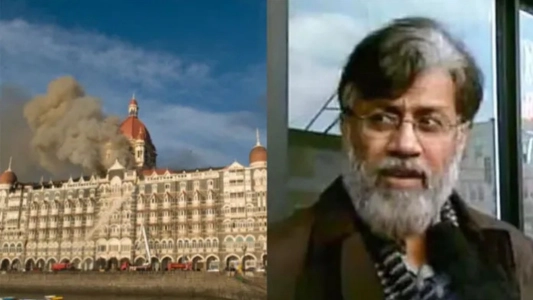In a significant step towards justice for the victims of the 26/11 Mumbai terror attacks, Tahawwur Hussain Rana, a key conspirator in the deadly attacks, has been extradited to India from the United States. This move follows years of legal proceedings and represents a major victory for the Indian government, which has long sought accountability for the tragedy that shook the nation.
Extradition Process: A Long Road to Justice
Tahawwur Rana, a Pakistani-origin Canadian-American, was arrested in the U.S. in 2009, alongside David Headley, another mastermind behind the attacks. Rana’s role in the attacks, particularly in providing logistical support to Headley, has been well-documented. As a key accomplice of the terror mastermind, he facilitated Headley’s reconnaissance missions in Mumbai and assisted in creating a false identity for him to gain entry into India. Rana’s actions have made him a central figure in the ongoing pursuit of justice for the victims of the 26/11 attacks.
The extradition was carried out under the India-U.S. Extradition Treaty, following exhaustive legal battles. Rana had previously exhausted all avenues of appeal in the U.S. to avoid deportation to India, a move that underscores the resolve of both countries to bring justice to the victims of one of the deadliest terrorist attacks in India’s history.
Rana’s Connection to the 26/11 Attacks
The 26/11 Mumbai attacks, which took place in November 2008, saw 10 heavily armed terrorists attack the city, resulting in the deaths of 166 people and injuring over 300 others. The terror operation was masterminded by the Pakistan-based Lashkar-e-Taiba (LeT), and Rana’s role in facilitating Headley’s reconnaissance missions in the city played a critical part in planning the attack. His extradition is a key moment in ensuring that all those responsible for the terror plot are held accountable.
The National Investigation Agency (NIA) had filed charges against Rana in 2011, but his arrest and subsequent extradition to India were delayed by years of legal wrangling in the U.S. Now, with Rana facing charges of conspiring to commit acts of terrorism, India is hopeful for a speedy trial, bringing closure to the victims’ families.
Pakistan’s Denial of Involvement
Amidst the growing tensions surrounding Rana’s extradition, Pakistan has distanced itself from the accused. A spokesperson for Pakistan’s Ministry of Foreign Affairs clarified that Rana had not renewed his Pakistani citizenship for over two decades, asserting that he was a Canadian national. Pakistan has maintained that it had no involvement in the 26/11 attacks, despite mounting evidence of the country’s role in harboring terrorists and supporting terrorist organizations like LeT.
This development highlights the complex international diplomacy involved in terrorism-related cases, where countries involved in global security efforts must often navigate delicate political and diplomatic challenges. While Pakistan has denied responsibility, India’s push for justice remains unwavering, with the hope that Rana’s trial will shed further light on the full extent of the conspiracy.
What’s Next for Rana and the Legal Process
Rana is expected to face charges of conspiracy, aiding and abetting terrorism, and providing logistical support to the 26/11 attackers. The Indian government, along with the NIA, will aim to prosecute him to the fullest extent of the law. Legal experts believe that the trial could take years, but the extradition marks a significant turning point in holding all individuals responsible for the attack accountable.
For many families who lost loved ones in the brutal terror attack, this extradition represents a long-awaited step toward justice. As the legal process continues, there is hope that the families of the victims will finally see closure and that those behind one of the most horrific attacks in modern history will be brought to justice.
Global Reactions and Impact
Internationally, Rana’s extradition has sent a strong message that terrorism-related crimes will not go unpunished. Countries around the world have expressed their support for India’s efforts to bring those responsible for the 26/11 attacks to justice. The U.S., in particular, has reaffirmed its commitment to combating terrorism and supporting India’s legal process. As the case progresses, it will likely serve as a reminder of the importance of international cooperation in addressing global terrorism.
Conclusion
The extradition of Tahawwur Rana is a significant milestone in the fight for justice for the victims of the 26/11 Mumbai terror attacks. With his trial set to begin in India, the case is expected to further unravel the depths of the terror conspiracy. The global community continues to support India’s efforts, underscoring the importance of holding perpetrators of terrorism accountable.
For more updates on the latest developments, stay connected with The Instant News, your trusted source for breaking news, updates, and in-depth coverage on global and national issues.



